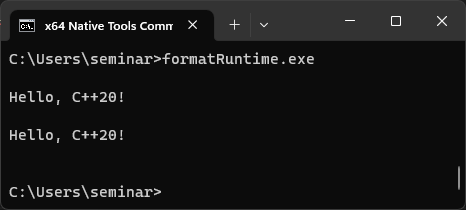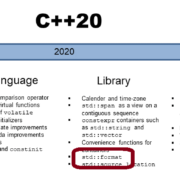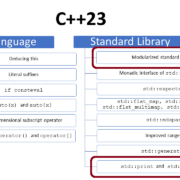The Formatting Library in C++20
Today, I will start a series about the formatting library in C++20. The series is based on my C++20 book.

Although Peter Gottschling wrote two great blog posts about the formatting library in C++20 (“std::format in C++20“, “C++20: Extend std::format for User-Defined Types“, I will write about the formatting library again. The reason is simple: Peter’s post gave you a great introduction and overview. I want to present all the details so that you can use this post and the upcoming ones as a reference.
C++20 supports the following formatting functions:

The functions std::format and std::format_to are functionally equivalent to their pendants std::vformat and std::vformat_to, but they differ in a few points:
std::format,std::_format_to, andstd::format_to_n:They require a compile-time value as aconstexprstring or a string literal.std::vformat, andstd::vformat_t: It’s format string can be a lvalue. The arguments must be passed to thevariadic function std::make_format_args. e.g.:std::vformat(formatString, std::make_format_args(args)).
The formatting functions accept an arbitrary number of arguments. The following program gives a first impression of the functions std::format, std::format_to, and std::format_to_n.
// format.cpp #include <format> #include <iostream> #include <iterator> #include <string> int main() { std::cout << '\n'; std::cout << std::format("Hello, C++{}!\n", "20") << '\n'; // (1) std::string buffer; std::format_to( // (2) std::back_inserter(buffer), "Hello, C++{}!\n", "20"); std::cout << buffer << '\n'; buffer.clear(); std::format_to_n( // (3) std::back_inserter(buffer), 5, "Hello, C++{}!\n", "20"); std::cout << buffer << '\n'; std::cout << '\n'; }
The program directly displays on line (1) the formatted string. However, the calls on lines (2) and (3) use a string as a buffer. Additionally, std::format_to_n pushes only five characters onto the buffer.

Accordingly, here is the corresponding program using std::vformat and std::vformat_n.
// formatRuntime.cpp #include <format> #include <iostream> #include <iterator> #include <string> int main() { std::cout << '\n'; std::string formatString = "Hello, C++{}!\n"; std::cout << std::vformat(formatString, std::make_format_args("20")) << '\n'; // (1) std::string buffer; std::vformat_to( // (2) std::back_inserter(buffer), formatString, std::make_format_args("20")); std::cout << buffer << '\n'; }
The formatString in lines (1) and (2) is a lvalue.

Presumably, the most exciting part of the formatting functions is the format string (“Hello, C++{}!\n“).
Format String
The formatting string syntax is identical for the formatting functions std::format, std::format_to, std::format_to_n, std::vformat, and std::vformat_to. I use std::format in my examples.
- Syntax:
std::format(FormatString, Args)
The format string FormatString consists of
- Ordinary characters (except { and })
- Escape sequences {{ and }} that are replaced by { and }
- Replacement fields
A replacement field has the format { }.
- You can use an argument id and a colon inside the replacement field followed by a format specification. Both components are optional.
The argument id allows you to specify the index of the arguments in Args. The ids start with 0. When you don’t provide the argument id, the fields are filled in the same order as the arguments are given. Either all replacement fields have to use an argument id or none; i.e., std::format("{}, {}", "Hello", "World") and std::format("{1}, {0}", "World", "Hello") will both compile, but std::format("{1}, {}", "World", "Hello") won’t.
std::formatter and its specializations define the format specification for the argument types.
- Basic types and
std::string: based on Python’s format specification - Chrono types: I present them in an upcoming post.
- Other formattable types: User-defined
std::formatterspecialization. I will present them in an upcoming post.
The fact that the format strings is a compile time variable, has two interesting consequences: performance and safety.
 Modernes C++ Mentoring
Modernes C++ Mentoring
Do you want to stay informed: Subscribe.
Compile Time
- Performance: If the format string is checked at compile time, there is nothing to do at run time. Consequentially, the three functions
std::format,std::format_to,andstd::format_to_npromise excellent performance. The prototype library fmt has a few exciting benchmarks. - Safety: Using a wrong format string at compile time causes a compilation error. On the contrary, using a format string at run time with
std::vformatorstd::vformat_tocauses astd::format_errorexception.
What’s Next?
I will use the next blog post to fill in the theory with practice.
Thanks a lot to my Patreon Supporters: Matt Braun, Roman Postanciuc, Tobias Zindl, G Prvulovic, Reinhold Dröge, Abernitzke, Frank Grimm, Sakib, Broeserl, António Pina, Sergey Agafyin, Андрей Бурмистров, Jake, GS, Lawton Shoemake, Jozo Leko, John Breland, Venkat Nandam, Jose Francisco, Douglas Tinkham, Kuchlong Kuchlong, Robert Blanch, Truels Wissneth, Mario Luoni, Friedrich Huber, lennonli, Pramod Tikare Muralidhara, Peter Ware, Daniel Hufschläger, Alessandro Pezzato, Bob Perry, Satish Vangipuram, Andi Ireland, Richard Ohnemus, Michael Dunsky, Leo Goodstadt, John Wiederhirn, Yacob Cohen-Arazi, Florian Tischler, Robin Furness, Michael Young, Holger Detering, Bernd Mühlhaus, Stephen Kelley, Kyle Dean, Tusar Palauri, Juan Dent, George Liao, Daniel Ceperley, Jon T Hess, Stephen Totten, Wolfgang Fütterer, Matthias Grün, Phillip Diekmann, Ben Atakora, Ann Shatoff, Rob North, Bhavith C Achar, Marco Parri Empoli, Philipp Lenk, Charles-Jianye Chen, Keith Jeffery, Matt Godbolt, Honey Sukesan, bruce_lee_wayne, Silviu Ardelean, schnapper79, Seeker, and Sundareswaran Senthilvel.
Thanks, in particular, to Jon Hess, Lakshman, Christian Wittenhorst, Sherhy Pyton, Dendi Suhubdy, Sudhakar Belagurusamy, Richard Sargeant, Rusty Fleming, John Nebel, Mipko, Alicja Kaminska, Slavko Radman, and David Poole.
| My special thanks to Embarcadero |  |
| My special thanks to PVS-Studio |  |
| My special thanks to Tipi.build |  |
| My special thanks to Take Up Code |  |
| My special thanks to SHAVEDYAKS |  |
Modernes C++ GmbH
Modernes C++ Mentoring (English)
Rainer Grimm
Yalovastraße 20
72108 Rottenburg
Mail: schulung@ModernesCpp.de
Mentoring: www.ModernesCpp.org







